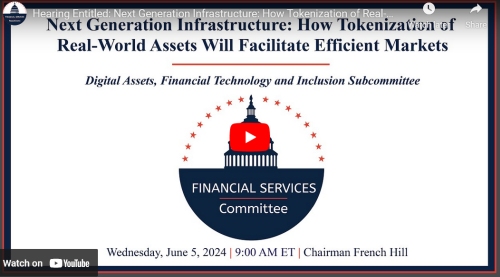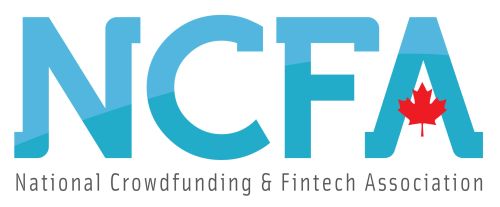Tokenization | Jun 11, 2024

 Image: Tokenization of RWA Tokenization Report Act of 2024 (youtube)
Image: Tokenization of RWA Tokenization Report Act of 2024 (youtube)US Congress considers the regulatory challenges and benefits of tokenization
On June 5, 2024, Washington lawmakers discussed the “Tokenization Report Act of 2024” (HR 8464), which is sponsored by Rep. William Timmons and co-sponsored by Rep. Ritchie Torres in the 118th Congress. The Act mandates a thorough report on the advantages and disadvantages of asset tokenization using blockchain technology, the variations between blockchain networks, the current level of interoperability, and international regulatory strategies.
The Federal Deposit Insurance Corporation, the Comptroller of the Currency, the National Credit Union Administration Board, and the Board of Governors of the Federal Reserve System are to jointly submit this report. Within 180 days after the act’s passage, the report must be given to the Senate Committee on Banking, Housing, and Urban Affairs and the House Committee on Financial Services.
See: U.S. House passes FIT21 with Bipartisan Support
Strong regulations are required to control the tokenization of RWAs, as recent talks in Washington have shown. The Securities and Exchange Commission (SEC) and the Commodity Futures Trading Commission (CFTC), among other legislative and regulatory organizations, are investigating the applicability of current securities and commodities rules to tokenized assets. The classification of digital tokens is a central topic of discussion in the policy space. The question of whether tokenized assets belong in the securities, commodities, or new asset class categories is being investigated by regulators. This classification will have a big impact on the regulations, taxes, and trading of these assets.
The Tokenization Report Act of 2024 (HR 8464)
Objectives
- Determine how blockchain technology is being used for asset tokenization, both now and in the future.
- Determine regulatory implications such as possible obstacles to regulation and suggested policies to deal with them.
- Examine the effects of tokenization on market liquidity, investor protection, and financial stability.
- Actionable suggestions should be given to legislators in order to promote a well-balanced regulatory environment that promotes innovation and protects the interests of all parties involved.
Scope of the Report
- An analysis of the advantages and disadvantages of tokenizing traditional assets via blockchain networks, taking into account effects on counterparty risk, cost, and settlement efficiency.
- The differences between permissioned and permissionless blockchain networks are compared, along with the consequences for asset tokenization.
- An evaluation of the state of blockchain integration and interoperability across various networks and platforms, as well as the implications for broad adoption.
See: Citi’s PoC Success in Private Market Tokenization
- Review of emerging global regulatory approaches to tokenizing traditional assets including capital requirements.
- An assessment of the additional guidelines or rules required to support the tokenization of traditional assets.
- An examination of how blockchain networks’ control features affect traditional assets that have been tokenized and how much of their current risk profiles they can carry.
- Synopsis of the regulations and legal framework around the tokenization of traditional assets using blockchain technology.
The act also requires the federal agencies concerned to gather public feedback in order to inform the report’s development. This makes sure that when developing the regulatory framework, the opinions of different stakeholders—such as investors, technology developers, and industry experts—are taken into account.
Key Takeaways from the Hearing
The real-world asset (RWA) tokenization’s disruptive potential was highlighted during the House Financial Services Subcommittee on Digital Assets’ recent hearing on the topic. Chair French Hill highlighted how blockchain technology may lower costs, improve efficiency and transparency, and alleviate liquidity concerns in order to modernize U.S. markets. See more at blockchain tipsheet
.[embedded content]
The Intelligence Authorization Act for Fiscal Year 2025 (S.4443) incorporates Senator Mark Warner’s Terrorist Financing Prevention Act (S.3441), which requires the identification of foreign financial institutions and digital asset facilitators involved in unlawful transactions. Although the goal of this action is to stop the funding of terrorism, there are worries about the growing sanctions and regulatory costs on the digital asset market.
See: Real World Implementation of Real Estate Tokenization
There was no denying the partisan divide during the hearing. Democratic members emphasized consumer safeguards and fraud prevention, frequently criticizing recent regulatory initiatives like the Financial Innovation and Technology for the 21st Century Act (FIT 21). Republican members, on the other hand, emphasized the innovation and efficiency brought about by tokenization.
The Depository Trust and Clearing Corporation’s Nadine Chakar emphasized how tokenization could improve the architecture of the financial markets. Nonetheless, there was a general consensus regarding the necessity for balanced legislation and the clarity of regulations. Representative Wiley Nickel and Vice Chair of the Subcommittee Warren Davidson expressed support for more precise rules to encourage innovation in the digital asset market.
RWA Tokenization Trends for 2024
- Tokenization is being adopted for a variety of asset classes by major financial institutional organizations, including HSBC, Goldman Sachs, and BlackRock. These establishments are employing blockchain technology to provide digital renditions of conventional financial instruments, including as money market funds and bonds.
See: MAS Update: Asset Tokenization in Project Guardian
Conclusion
The Tokenization Report Act of 2024 is essential because it lays the groundwork for well-informed government that promotes innovation while defending investor interests. The future of tokenization will be shaped by the continuing legislative initiatives and regulatory conversations, opening the door to a more effective and inclusive financial environment.

 The National Crowdfunding & Fintech Association (NCFA Canada) is a financial innovation ecosystem that provides education, market intelligence, industry stewardship, networking and funding opportunities and services to thousands of community members and works closely with industry, government, partners and affiliates to create a vibrant and innovative fintech and funding industry in Canada. Decentralized and distributed, NCFA is engaged with global stakeholders and helps incubate projects and investment in fintech, alternative finance, crowdfunding, peer-to-peer finance, payments, digital assets and tokens, artificial intelligence, blockchain, cryptocurrency, regtech, and insurtech sectors. Join Canada’s Fintech & Funding Community today FREE! Or become a contributing member and get perks. For more information, please visit: www.ncfacanada.org
The National Crowdfunding & Fintech Association (NCFA Canada) is a financial innovation ecosystem that provides education, market intelligence, industry stewardship, networking and funding opportunities and services to thousands of community members and works closely with industry, government, partners and affiliates to create a vibrant and innovative fintech and funding industry in Canada. Decentralized and distributed, NCFA is engaged with global stakeholders and helps incubate projects and investment in fintech, alternative finance, crowdfunding, peer-to-peer finance, payments, digital assets and tokens, artificial intelligence, blockchain, cryptocurrency, regtech, and insurtech sectors. Join Canada’s Fintech & Funding Community today FREE! Or become a contributing member and get perks. For more information, please visit: www.ncfacanada.org
Related Posts
- SEO Powered Content & PR Distribution. Get Amplified Today.
- PlatoData.Network Vertical Generative Ai. Empower Yourself. Access Here.
- PlatoAiStream. Web3 Intelligence. Knowledge Amplified. Access Here.
- PlatoESG. Carbon, CleanTech, Energy, Environment, Solar, Waste Management. Access Here.
- PlatoHealth. Biotech and Clinical Trials Intelligence. Access Here.
- Source: https://ncfacanada.org/insights-from-the-tokenization-report-act-of-2024-hearing/



